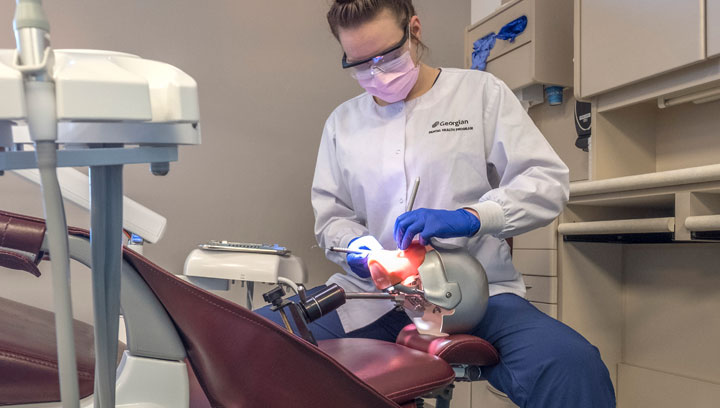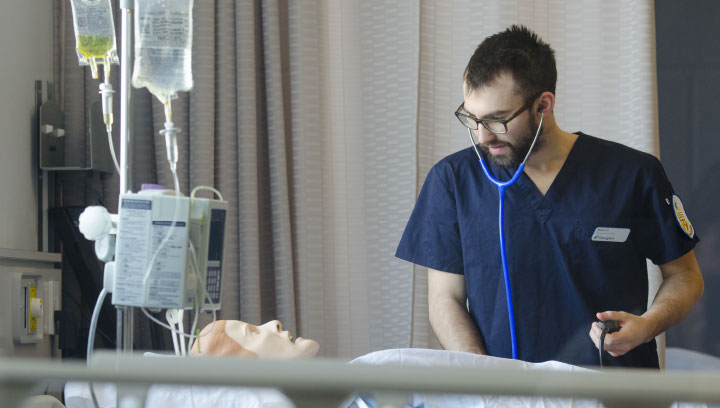
Provide quality, end-of-life health care to the elderly
Gerontology and Palliative Care – Interprofessional Practice Ontario College Graduate Certificate program
Create and deliver customized treatment plans to maintain and promote physical, mental and emotional health of geriatric and palliative clients and family.
Program information
Program description
This program is designed to assist Internationally Educated Nurses (IENs) to work as part of an inter-professional healthcare team in geriatric and palliative care settings. Students acquire the knowledge and expertise to enhance an individual’s quality of living and dying as part of an end of life process. To meet the individual needs of the client during this transitional phase of their life, students examine current theories and explore best practices to build skills in assessment, planning, intervention, and evaluation. Through a combination of classroom instruction and lab, students focus on the importance of communication, spirituality, ethics, law and culturally responsive nursing care for an aging or end-of-life population. Students will have an opportunity to consolidate their classroom learning with one practicum placement in a variety of settings that may include hospital, community, home care or long term care.
Intake information
Tuition and fees
- Visit our tuition and fees page for detailed information on the cost to attend Georgian.
- You can afford this! Explore OSAP as well as awards, scholarships and bursaries to help you pay your way to graduation.
Work-integrated learning
- This program includes a clinical placement component where you’ll get clinical experience under the supervision of an experienced registered or licensed professional.
- Learn about types of work-integrated learning at Georgian.
What are the admission requirements for the Gerontology and Palliative Care program?
Gerontology and Palliative Care – Interprofessional Practice admission requirements
Ontario College Diploma, Ontario College Advanced Diploma, Degree, or equivalent in nursing
Selection Process
Preference will be given to applicants with the following:
- Post-secondary degree in nursing from an accredited nursing education program
- Current registration with the nursing regulatory body in their home province/state and or country (i.e. letter, membership card, etc.)
Additionally, priority will be given to students who have graduated from Georgian’s Complex Care Nursing for Internationally Educated Nurses program.
Language Proficiency Requirement
The English proficiency requirement can be met through:
- IELTS with an overall score of 6.5
- Other English language proficiency test options and further information can be found in Georgian’s English Language Proficiency policy 2.5 at: https://georgiancollege.ca/admissions/policies-procedures
Criminal Reference/Vulnerable Sector Check
Placement agencies require an up-to-date clear criminal reference check and vulnerable sector check prior to going out on placement. Students should obtain their criminal reference three months prior to placement; checks conducted earlier may not be considered current. As some jurisdictions require longer lead-time for processing, please check with the program coordinator to ensure you allow for sufficient turn-around time. It is the student’s responsibility to provide the completed document prior to placement start.
NOTE: Individuals who have been charged or convicted criminally and not pardoned will be prohibited from proceeding to a clinical or work placement.
Additional information
Students must have up-to-date immunization records in compliance with the Public Hospitals Act. Students must also have a valid mask fit test, BLS CPR and Standard First Aid. Students are to use the Clinical Preparedness Permit to document completion of these clinical requirements.
Completion and submission of this permit is required in order to ensure placement in clinical and field placement facilities.
Students will be placed in a variety of agencies in the region serviced by the campus. Students are required to provide their own transportation to the placement site.
Information about placement requirements
To help you navigate the requirements to complete the clinical placement component(s) of this program (e.g. immunization, First Aid and CPR, criminal record screening and other non-academic requirements), please review the details below.
For more information about placements, visit the Placement Offices webpage.
In order to provide quality practicum placements (“Placements”), students are placed in a variety of agencies, largely in the region serviced by the campus. Students are required to provide their own transportation to Placements. Placements may vary in length (e.g. six to 12 hour days) and may include weekends and evenings, with varying start and end times (e.g. day, afternoon, overnight).
Many programs, including Health and Wellness, have immunization, First Aid and CPR, criminal record screening and other non-academic requirements that need to be met prior to Placements starting. You are responsible for carefully reviewing and meeting these requirements. The failure to meet them may mean that the host agency may refuse to accept you for a Placement or, if you have started one, that you may be prevented from continuing. The result may be that you cannot complete your program. Program-specific requirements can be found on page 2 of the Clinical Preparedness Permit specific to your program.
You are responsible for meeting all immunization, criminal screening and other requirements by the deadline provided by your program and before you start your Placement.
Notes regarding the Criminal Record Check (“CRC”) and Vulnerable Sector Screening (VSS)
Individuals who have been charged or convicted criminally and not yet pardoned or who have adverse entries on their CRC or VSS will be prohibited from proceeding to a Placement. Such a student will normally be counselled to withdraw from the program because the successful completion of a Placement is a program requirement.
Obtaining the CRC and VSS usually requires a processing time of up to 12 weeks and can vary between police jurisdictions. As some jurisdictions require longer lead time for processing, ensure you allow for sufficient turn-around time. Record checks and screenings conducted earlier than six months may not be considered current and not be acceptable. Refer to your Clinical Preparedness Permit for information regarding this. A host agency may refuse a Placement if the CRC or VSS is not satisfactory to it. It is the student’s responsibility to provide the necessary completed documents prior to the start of a Placement at the designated check time, and in the format set by Georgian College and stated in the Clinical Preparedness Permit Information Package. More information can be found on the Placement Offices webpage.
The costs associated with the provision of the CRC and VSS, anything related to them (including, if applicable, obtaining a pardon), and meeting any immunization and other Placement requirements, are to be borne by the student. The non-academic requirements of clinical agencies as described in the Clinical Preparedness Permit are subject to change at any time and host agencies may accept or decline students for any reason at their discretion. Georgian College is not responsible for any of the costs associated with the foregoing, nor for the consequences of failing to comply with, any of the requirements set out above.
What career paths can I take in geriatrics and palliative health care?
Your Gerontology and Palliative Care graduate certificate gives you many career opportunities
Graduates of this program are able to work within their scope of practice in the area of geriatric and palliative care and may find employment opportunities in acute care settings within general hospitals, specialized hospitals, long-term care, retirement homes, hospice, palliative care units, and clinics and/or community health services.
What courses are included in the Gerontology and Palliative Care graduate certificate program?
Course overview
11 Program Courses
1 Clinical Placement
Program-specific courses
Semester 1 courses are listed below. For a full list of courses in the program including course descriptions, view the Gerontology and Palliative Care – Interprofessional Practice program outline.
- GPCN 1000 – Introduction to Geriatrics and Gerontology
- GPCN 1002 – Pathophysiology of Aging
- GPCN 1003 – Legal and Ethical Issues Related to Aging
- GPCN 1004 – Special Topics in Geriatrics
- GPCN 1012 – Gerontology Integrated Seminar
- GPCN 1014 – Gerontology and Palliative Care Nursing Skills and Assessments
Your course delivery method(s)
In person
This program is delivered fully in person and requires you to attend campus.
Please note, delivery methods are based on planning for the upcoming semester and are subject to change.
Check out our other related programs
Biotechnology – Health
Explore this high-tech trade as you become proficient with techniques in molecular biology, cell biology, chemistry and physiology.
Dental Hygiene
Top scores in student and employer satisfaction. State-of-the-art learning facilities. Great community connections. Excellent careers!
Practical Nursing
Caring, committed faculty. More clinical time to build your skills. State-of-the-art facilities. Our students excel on provincial exams!
Pre-health Sciences Pathway to Advanced Diplomas and Degrees
Your first step toward further studies in health programs. Develop your employability skills. Be on your way to a career in health care!
Do you have questions about Gerontology and Palliative Care? Contact us!
Thinking about applying to Georgian?
Contact our student recruitment team to explore your study options.
Already applied to Georgian?
Connect with the Office of the Registrar for admissions-related questions.
Are you an international student?
Contact our international recruitment team to learn more about studying at Georgian.
Ways to connect

Attend a GTKG virtual info. session on July 8th, and Aug. 12th
Register for an upcoming session
Take a guided, in-person tour
of our campuses.
Book a campus tour.
Book a phone appointment
with a recruitment specialist.
Connect with a recruiter.
Join our email list for event updates, contest information and more.
Sign up for Georgian updates.







